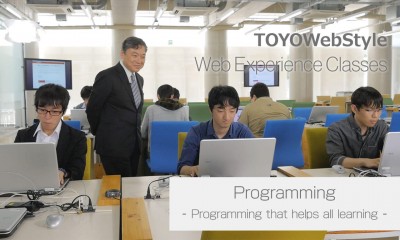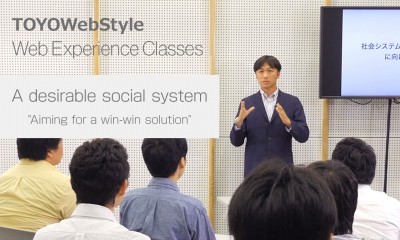Faculty of Information Sciences and Arts

Integrating humanities and sciences to create the "next richness".
Through a curriculum that integrates the humanities and sciences, students cultivate comprehensive knowledge and skills that are not bound by the conventional frameworks of said fields, and deepen their studies in accordance with their individual aspirations and interests.
The Media Informatics Course, the Psychological and Sports Informatics Course, and the System Informatics Course offer distinctive learning experiences. Students can also acquire specialized skills in AI and data science. They will gain an approach to achieving wellbeing through a combination of practical learning.
Faculty members will carefully attend to each student and provide support not only in the classroom, but also in adapting to the university environment, obtaining qualifications, and career paths after graduation.
Departments
- Department of Information Sciences and Arts (Media Informatics Course)
- Students will hone their media expertise, particularly their game and CG production skills in response to the current "Web3," and deepen their understanding of AI and data science used in content production while learning about XR technologies such as VR and AR. They will also learn about the various forms and roles of media that convey information widely, and learn how to think about, design, and express them. Let's think about how content (information) or media (media for conveying information) can enrich people's minds through many practices of learning from content creation to transmission through the media.
- Department of Information Sciences and Arts (Psychological and Sport Informatics Course)
- The integration of the humanities and sciences enables students to learn psychology and sports science, as well as AI and data science that can be applied to these fields. Depending on their own interests, students can specialize in each theme or study them in combination.
Psychology and sports science are among the fields that have a high affinity with advanced technologies, such as the use of data science to collect and process large amounts of information and AI-based analysis to gain new perspectives. In this Course, students will collect, analyze, and utilize objective data on the human mind (psychology), body, and sports, and acquire specialized knowledge to support people's mental and physical health.
The ability to learn from real data with the help of on-campus athletes is another significant advantage. - Department of Information Sciences and Arts (System Informatics Course)
- Today, AI is pervasive in every corner of our lives, and we are benefiting from it. To make use of it, it is necessary not only to know about AI itself, but also to develop and design systems that incorporate AI and the software that runs them, and to build networks. It is also important to have the skills to create business models for the diffusion of AI-based systems in society. The System Informatics Course provides a curriculum that cultivates both the skills to use AI and to design and develop systems, software, and networks, as well as the skills to deploy them in business. Through a wide range of studies that transcend the boundaries of the humanities and sciences, students will gain the ability to change society to make it "safe, secure, and comfortable".
Learning Columns
The Learning Columns present articles and videos that describe the activities of Toyo University students and departments.

Programming, – Programming that helps all learning –
Minoru Uehara, Professor (Department of Information Sciences and Arts (System Informatics Course) / Faculty of Information Sciences and Arts)
Research Fields: Networks, The Web, Distribution systems, Grids, Programming

A desirable social system, aiming for a win-win solution
Yoshiomi Otsuka, Professor (Department of Information Sciences and Arts (Psychological and Sport Informatics Course) / Faculty of Information Sciences and Arts)
Research Field: Urban Environmental Engineering, Urban Environmental System, Environmental Behavior Psychology

